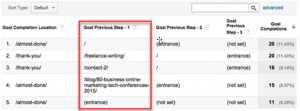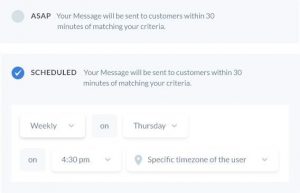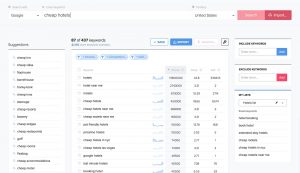
Top marketers leverage both their creative writing skills and their data analytics to inform every step of their content strategy. By crafting a great story and also analyzing data around open rates, click-through-rates, and behavior analytics, they can create campaigns that convert.
By constantly reviewing data, content marketers can uncover deep insights into consumer behavior. Gone are the days of guessing about the performance of marketing strategies. It is no longer good enough just to spray your message everywhere and hope it works.
Often, through tracking technology and attribution models, you can even string together the exact path that took a customer from exposure to purchase. By taking advantage of a wealth of information that data can provide, you can optimize your content strategy – and see material improvement nearly instantly.
From cross channel tracking to sentiment analysis, content marketers have never had more actionable data at their fingertips than they do now.
Data-Driven Content Insights
As a content marketer, your primary objective is to create content that offers value to your audience in a way that builds rapport for your brand. To accomplish this, you must monitor the key performance indicators (KPIs) of your content and how audience engagement translates into profit.
For instance, you should measure KPIs top of the funnel, middle of funnel, and bottom of funnel metrics for each content marketing campaign. These KPI’s include average position of unbranded terms (top), new leads by a content asset (middle), and pipeline created by an asset (bottom).
Doing so enables you to analyze how your various content campaigns drove site visitors that turned into leads and then buyers. As a baseline content, marketers should be using Google Analytics to accomplish track and analyze campaigns. Google Analytics enables you to monitor for the activity that ultimately leads to conversions.

Beyond funnel metrics, you can also piece together the customer journey and uncover interesting customer behavior insights using more advanced analytics tools such as Mixpanel. The biggest benefit of using Mixpanel is the ability to track individual users and deliver targeted email, text, and popup messages base on their online content consumption behaviors.

Uncover Content Strategies In Data
While there will always be a place for marketers to brainstorm new ideas for the best content, and ideal target audiences, many of these large questions around who to target, with what content, and when can be answered by reviewing data. Rather than creating content that caters to a broad audience, using data, content marketers can focus on content that resonates with the most loyal customers.
Content analytics enables marketers to pinpoint the topics that are trending among potential buyers as well as the best channels to deliver brand messages. It allows them to hone in on developing the content that works best with their desired audience.
For example, by testing content titles, marketers can understand what topics drive the most interest. Additionally, creating multiple landing pages that stress different product benefits can help uncover what drives the most purchases.
In addition to enabling strategists to discover which assets resonate with their audience, analytics enables marketers to pinpoint when their audience consumes content. For example, Hubspot allows marketers to analyze read receipts, improving on the traditional trial and error method of figuring out when to deliver brand messages.
Hubspot reporting also enables marketers to review whether mailing list subscribers actually read emails or only skimmed the information. It’s reporting tools also will allow you to examine historical email “clicks” and “opens” data to understand the best time to deliver email marketing messages.
Embracing the Data
For some content marketers, who traditionally work with words, to embrace numbers. Marketers are still learning the best ways to leverage data. However, you don’t need to be a data scientist to gather insights from marketing data.
To begin incorporating data analysis into your content marketing strategy, even seemingly small tweaks can make a big difference. You can start by running short content tests on existing campaigns and using that data to inform future content.
For example, create two different email drip campaigns and run them on two audience segments. Using open rates,click-through rates and purchases you can identify which content is resonating with your audience. Use this content in digital ads and landing pages to see if you see additional results.
Another quick win can be to do some keyword analysis. Keyword analysis enables marketers to track their SEO performance with thousands of keywords – as well as their competitors. You can see what search terms on Google return your top pages. If competitors are showing up, you may need to create more engaging content for those topics. Tools like Wordtracker enables marketers to find and review critical performance information quickly, if not in real-time.

Focusing on What Counts
Once you begin to track and measure campaign performance, it is easy to get carried away with measuring everything and feeling information overload. Monitoring content strategy KPIs using multiple tools can grow into a cumbersome exercise in information overload, making them highly inefficient.
Rather than paring down your tech, however, the answer lies in business intelligence tools. Business intelligence tools like, Datapine’s data analysis platform, enables you to create a customized executive dashboard that scales to your needs no matter how many resources you leverage. It enables you to keep critical metrics from disparate sources such as Google Analytics, Hubspot, Wordtracker and a wide range of other tools at your fingertips, allowing you to keep a range of KPIs within easy reach.
If you’re not currently using analytical tools to inform your content marketing strategy, start today with small measurements. Once you do, you’ll enjoy the benefit of making the numbers sing a song of success for every content marketing campaign that you execute.

